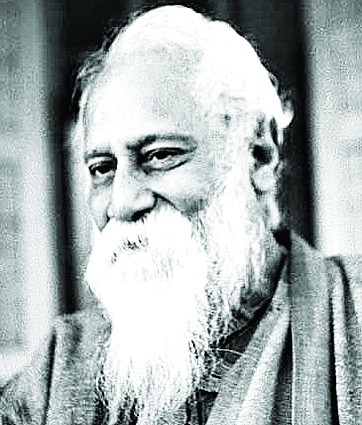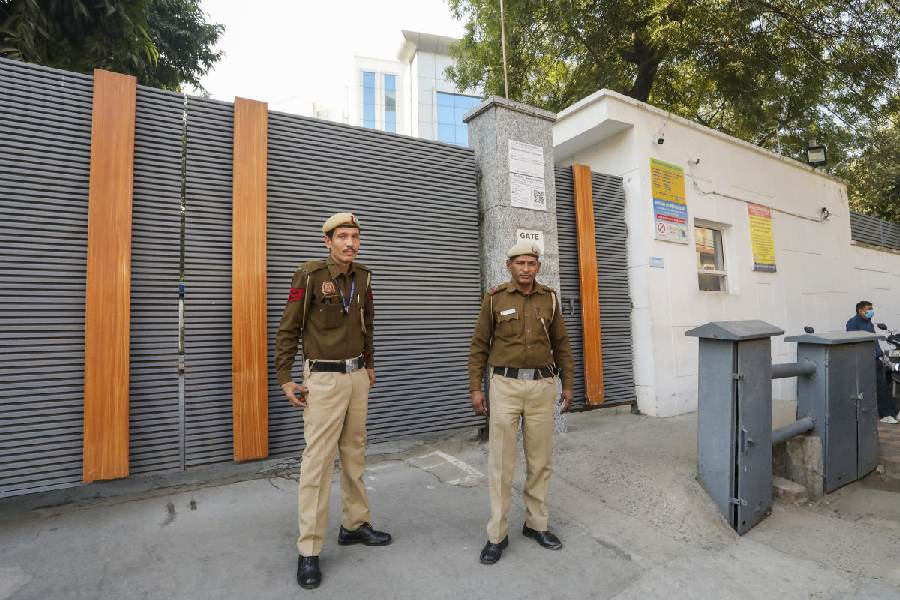
I feel like a full-fledged Bong dinner tonight, she said, curled up on my grandparents' four-poster with the unguilty self-indulgence of the errant NRI, but does that mean we'd have to go to one of those ghastly family places where there's no alcohol and they play Tagore on the synthesizer? Possibly, I answered, they do make the gloom rise up from deep within one's guts, don't they? Before long, we got talking about the Old Man and his songs. She did not have a word of Bengali, but knew a great deal about Hindustani classical music and had grown up with Cole Porter and Begum Akhtar in Parsi Colaba. I tried to make her see the social comedy that is often part of how Rabindrasangeet lives on amidst our lives in this crumbling new blue-and-white city of monsoons and medicine cabinets. (This wasn't easy, for we were both steadily working through mid-morning Bloody Marys.) From as far back as I could remember, I resented the ways in which Bengali respectability ended up chastening, and thus trivializing, the unsettling eroticism at the core of Tagore's lyric sensibility. Some blame the plain-living-high-thinking Brahmos for this, I said, for not only did they turn their weddings into funerals and funerals into weddings, as a renegade from the tribe used to put it, but they also dampened Tagore's radical sexuality into a kind of disembodied lugubriousness by insisting on interpreting prem [love] as puja [worship]. I was using Tagore's own not-entirely-unironic labels for lending to the uncategorizable universe of his songs a veneer of acceptability. After all, this is someone who, at forty-nine,sang Amar shokol niye boshe achhi shorbonasher ashaye. If you say that in English, it's something like, I'm sitting with all that is mine hoping for everything to be reduced to nothing - and he put it in a play and called it "Grandpa's Song". You've probably heard it at one of the traffic lights here. Uff, that sounds like our incestuous Tante Brünnhilde, Frau Suttee von Valhalla, she guffawed, but I attempted the English Gitanjali once, and it sounded like Kahlil Gibran, or worse, so I gave up.
It's a pity, I persisted with her, that Tagore was possibly his own worst translator, for it was the vernacular that was his natural language of modernity. He could be as avant garde as Rilke, Hofmannsthal or García Lorca in Bengali - or more. Yet, the moment he switched to English, he slid back a century or two. But with the songs that seem to be addressed to god, there is always an exit clause for those who are indifferent to, or bored by, the idea of divinity. Like me, she said, I can't even be bothered to be an atheist; human beings are way more interesting. Ah, I said, you believe in the jiban-debata - the god of life, the god in life. Then I suddenly thought of a wickeder approach. I showed her some photographs of the young Rabindranath. Gosh, she immediately sat up straight, he was dishy! No wonder that Argentinian bluestocking fell for him hook, line and sinker even when he was an old man. Yumyum, she scrutinized the photos as she struggled to light up with damp matches I had fished out from somewhere, quite as hot as Ray one would say, no? And don't tell me Ray was a Brahmo too [she pronounced it Brummow]! Of course he was, I grinned, and if you watch his films carefully you will see how the sanctimonious gene rears its head every now and then. Yes, I think I know what you mean, she blew out lecherously, but what about that actress, Maadhvi, with her lovely bad teeth, or that luscious widow in a sweaty blouse with her bra showing through and decked up in subaltern bijouterie, frightening that poor middle-class prig out of his wits in Aranyer Something or the Other? O how I loved that film! And darling topless Simi painted all over with boot-polish trying to be tribal... now, that was naughty of Shottojitbaboo, was it not? Aha, I begin to see it all now, the good-angel-versus-bad-angel thing going on in the films, and indeed in so much else in the best of your upper-middle Bongoland. (She was sinking deeper into vodka.) Everything is starting to fall into place now... you schizoid hybrids... especially those wonderful madwomen smoked out of their attics, like Nabaneeta and Mahasweta, may her soul rest in peace, and brilliant ol' Gayatri with her crew-cut and her Kali songs, her de Man and her Derrida, and the stuff she is doing with teachers in the villages... O yes, the un-coer-cive re-arrange-ment of de-sires, isn't that what she calls it? Goodness, I think I'm beginning to understand - though goodness, I suspect, has nothing to do with it. Damn, I must find a way of staying on for longer in Calcutta, she said falling back on the bolster, and to think that I had taken it for such a dump. (By this time, I was trying hard not to beam like the Cheshire Cat.)
*************
While working recently on the artist and writer, Moyra Davey, I was led to an anthology called Mother Reader: Essential Writings on Motherhood, which Moyra had edited in 2001. "My aim for Mother Reader," she writes in the introduction, "has been to bring together examples of the best writing on motherhood of the last sixty years, writing that tells firsthand of the mother's experience." I read the book with the excitement of a thriller. Every morning it filled my expanding head-room with the desire to sit and write with an exhilaration that no other book had inspired in me in recent times. I was somewhat disconcerted by this. I thought I had outgrown my "Eighties feminism" years of being an undergraduate in Calcutta. But moving on is perhaps never as simple as it is made to sound.
Of course, I was reading Moyra's anthology across two huge distances. First, as a queer man un-invested in having children, I had no 'authentic' access to the wealth of experience, reflections and writing assembled in the book. Second, everywhere around me at home, I was surrounded by the traces and braces of motherhood that were so different from the worlds from which Moyra's mothers wrote that the gulf between her anthology and my environment appeared unbridgeable. With Jane Lazarre, Adrienne Rich, Tillie Olsen, Alice Walker, Doris Lessing and Susan Rubin Suleiman as her "touchstones", Moyra had put together an entirely "Western" anthology. Yet, I found myself riveted and unspeakably moved by it.
Then, fifty-one years after my birth, and nearly six years after my own mother's death, the book took me back suddenly, shockingly, to the very month and year that I was born. And this made me experience what we call "history" as it may, or may not, have passed through my mother's body and mind in a manner that I had never imagined before. It also made me inhabit my own body, mind and sex in a startlingly novel way in the real time of reading, writing and remembering.
I often find myself looking up 1965, the year of my birth, when I have nothing better to do, and the internet throws up different bits and pieces of contemporaneity: a Beatles concert, the India-Pakistan and the Vietnam wars, My Fair Lady winning eight Academy Awards. But, while reading Moyra's anthology, I came across the essay, "Anger and Tenderness", from Adrienne Rich's Of Woman Born: Motherhood as Experience and Institution of 1976, in which the writer reflects on diaries kept around the time of the birth of her three sons in the mid to late Fifties. In the third part of the journal-essay, I halted at "April 1965", the very month of my birth, and read: "Anger, weariness, demoralization. Sudden bouts of weeping. A sense of insufficiency to the moment and to eternity...
"Paralyzed by the sense that there exists a mesh of relations, between e.g. my rejection and anger at [my eldest child], my sensual life, pacifism, sex (I mean in its broadest significance, not merely physical desire) - an interconnectedness which, if I could see it, make it valid, would give me back myself, make it possible to function lucidly and passionately - Yet I grope in and out among these dark webs -
"I weep, and weep, and the sense of powerlessness spreads like a cancer through my being."
With that word, interconnectedness, slowly working its way into my head, I remembered my parents and other family members often mirthfully recounting to me the story of how the umbilical cord had almost strangled me during my birth. The doctor had told my father that he could make either the baby live or the mother. "Hang the baby!" my father had declared without a moment's thought. I noticed again that the epigraph to the essay by Rich was from Simone Weil's First and Last Notebooks: "...to understand is always an ascending movement; that is why comprehension ought always to be concrete."
*************
Sometimes, on an afternoon full of rain, after thin-crust pizzas and too many Bellinis, they would allow themselves a siesta on her great old bed. She would reach out across the cushion, that safest of hillocks placed between their bodies, and hold the cool flesh of her upper arm, and their eyes would meet across the coming of sleep and she would let herself say out loud to her, against all reason and logic, all good taste and adulthood, risking all the truth and all the treachery of words, all the thrill of having invented something dangerously new yet hideously old, my baby, she would say to her, and their gazes would remain locked for a while after the speaking of those terrible words, at once maternal and paternal, sexual and asexual. Then, after she had slept and she stayed awake looking at her face, oh the confusingness of same-sex pronouns compared to the clarity of he and she, she would think before sliding into oblivion: she is neither a baby nor mine, yet what is it that made me say that, and what does it remind me of? And she would have a moment of clearheadedness that some call recognition, or re-cognition, compelled to know again what one always knew. It was like being on the MH370 that night in March two years ago, flying across the South China Sea, and the little airline pillow was perfectly wedged between her neck and the window-pane and the little bottle of wine had made her just the right sort of woozy and the plane felt motionless above the stretch of horizonless dark water and she was freed for a few seconds from the fear of flying, loosening her seatbelt to curl up her legs and feeling she could let herself fall asleep at last. Yes, that is what this feels like, she would think on that bed - exactly.










